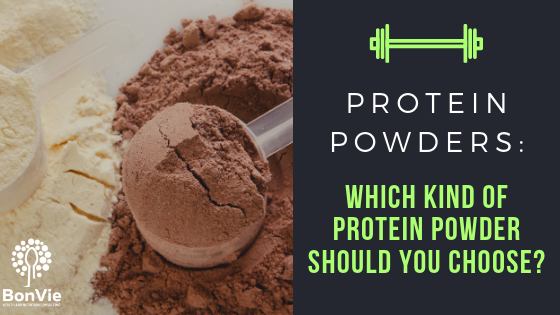
13 Sep Protein Powders: Which Kind Is Best for You and Your Goals?
There are tons of brands and blends of protein powders out there, but how do you know which brand and type of protein powder to pick with so many options?
Below you will find tips, tricks, and all the basics you need to know, to help you narrow down the choices to ensure that your protein powder selection is high quality and caters to your health goals and lifestyle!
1.Types of Protein Powders:
Protein powders come from a variety of sources, including dairy, egg, rice, peas, and meat (bone broth and collagen protein powders). Whether your protein powder comes from protein concentrates, protein isolates, or protein hydrolysates will determine how quickly it’s absorbed into your body and how much of the product is pure protein, but they are all wonderful sources to help refuel broken down muscles (think post-workout recovery) and to supplement protein needs in your diet. That brings us to point #2…
2. Protein Powders are SUPPLEMENTS:
Meaning, that they should SUPPLEMENT your diet, not be your sole source of protein. In fact, if you can avoid protein powder and get all of your protein in from whole food sources — that is ideal. Protein powders are useful for people who have trouble meeting their protein goals, especially athletes who must consume a larger quantity of protein, vegetarians or vegans, and those who are elderly or have dementia. If you happen to get an adequate amount of protein per day without the use of a powder, you may not find any additional benefit from adding in a protein supplement. However, protein supplements can be good for fat loss, since most protein sources (such as beef or cheese), contain a higher percentage of fat than pure protein powders would! Protein powder is also the ultimate convenience food!
3.Common Types of Protein Sources (Animal-Based Sources):
- Whey protein (probably the most well-known protein powder) and Casein protein both come from milk. Whey protein is one of the quickest digesting protein sources, and casein takes a little longer, but both be great sources for muscle recovery, growth, and maintenance. Note, however, that these would be a terrible choice if you’re lactose intolerant! Take it from someone who took months to figure out the source of her gas and bloating…eek!☺
- Egg protein clearly comes from eggs. There are companies that sell dehydrates plain egg whites, to which you simply add water and the powder becomes an instant egg-white shake. Eggs are a complete protein source, meaning they produce all varieties of amino acids that our bodies need. This could be a good option if you’re sensitive to dairy, but if you’re not a fan of vegan protein sources.
- Animal protein is available in the form of bone broth and collagen protein powders. These are my personal go-to choices, since they are also free of dairy, beans, soy, and eggs (all of which I’m personally sensitive to). Oh, and quick shout out here to my friends on a Paleo diet – these proteins are perfect for you! They are derived from animal muscle tissue and animal bones. Consuming bone broth and collagen-based protein can not only promote muscle growth and prevent muscle loss, studies have shown them to have anti-aging properties and to support bones, joints, and skin elasticity. And don’t worry – they don’t taste anything like animals…how gross would that be?! They are available in many delicious flavors (vanilla, chocolate, coffee, pumpkin spice, s’mores, banana, and more) and even unflavored options (great for mixing into drinks and soups).
4.Common Types of Protein Sources: (Vegan Sources)
- A common misunderstanding is that vegan-based protein sources are not as “good” as non-vegan sources. However, pea protein is an excellent source of protein for those who are vegan, vegetarian, or those who may be allergic or more sensitive to some of the non-vegan options. In fact, research has shown pea protein to be just as effective in growing muscles as animal-based protein powders, since it contains almost all of the amino acids your body needs. Peas are also extremely high in BCAAs or Branched Chain Amino Acids (the building blocks or structural units of protein).
- Another common type of vegan protein is brown rice protein. Brown rice protein, like all proteins from whole grains, is an incomplete protein. However, research has shown it does have an overall positive impact on muscle growth and body composition, and can be a great option for those who may have dietary restrictions or limitations, or just a sensitive stomach.
- Soy protein is another vegan protein source that contains all of the body’s essential amino acids! Soy protein contains large quantities of these animo acids, which makes soy protein great for muscle growth and repair. However, some people choose not to buy this source of protein due to the fact that soy is usually genetically modified to produce large quantities.
5. Find A Good Quality Powder:
First and foremost, make sure to check the nutrition label of any protein you choose! The protein you choose should be derived from pure sources (either vegan or non-vegan), have a protein packed nutrition label, and contain the fewest amounts of additives possible. You should also pick a protein powder you know will AGREE with you. If you are sensitive to dairy, perhaps whey and casein may not be your best choice. It may take a few purchases to find a protein powder which you enjoy the most and one that also makes you FEEL the best. Each brand is different and each brand usually has a variety of flavors to choose from, so take some time to research what you are looking for in a protein powder before making a decision! Companies also usually sell free or discounted samples of their proteins, which may be a good choice for someone who is on the fence!


No Comments